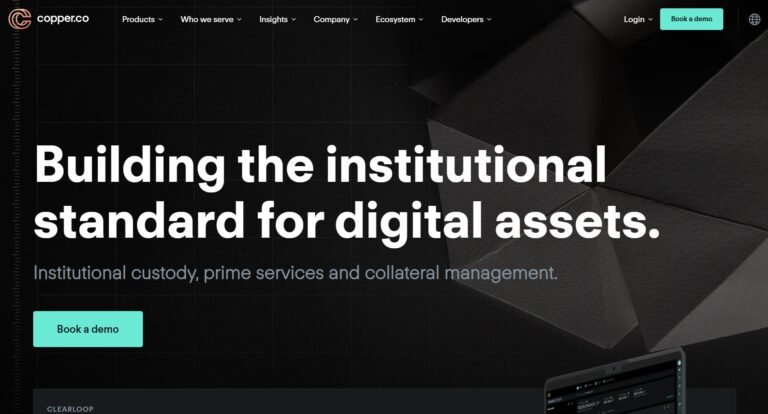Table of Contents
Introduction to Copper.co
This Copper.co review dives deep into the platform’s legitimacy, claims, and investor experiences. Copper.co presents itself as an institutional-grade crypto brokerage and custody solution, headquartered in the United Kingdom. It claims to offer advanced crypto trading, secure custody, and compliance-focused services.
But despite these bold claims, investors have raised serious concerns about withdrawals, transparency, and overall trustworthiness. This leaves many asking: is Copper.co a scam or truly a legitimate platform for institutional crypto services? This Copper.co review uncovers all the warning signs you need to know.
Copper.co: Regulation & Legal Status
One of the first factors to evaluate with any broker is its regulatory status. Copper.co states that it operates under UK jurisdiction, but there is no evidence of oversight by top-tier regulators such as the SEC, FCA, or ASIC. Without clear licensing information, such claims can be misleading to prospective clients.
Operating without top-tier regulation exposes clients to significant risks — no client fund protection, no dispute resolution mechanisms, and no formal oversight. This lack of oversight is a common tactic used by questionable brokers to appear credible while avoiding accountability. Learn how to spot a scam broker before it’s too late. The lack of transparency raises serious questions about whether Copper.co is a scam.
Trading Conditions & Platform Analysis of Copper.co
Copper.co claims to provide secure custody solutions, crypto trading, and infrastructure for institutional clients. However, it lacks publicly available details about its account structures, transaction fees, or liquidity providers. There are no clear disclosures regarding spreads, commissions, or execution transparency.
While it emphasizes its platform security, institutional-grade APIs, and compliance tools, these features do not guarantee safety for users. As with any broker, having advanced tools doesn’t equal credibility. What to check before signing up with a trading platform. These gaps make it harder to dismiss the idea that Copper.co might be a fraud.
Reputation & User Reviews About Copper.co
Reviews about Copper.co are mixed. While some institutional clients praise its infrastructure and custody solutions, there are concerning reports from smaller clients citing withdrawal delays, poor customer support, and opaque processes.
Feedback on platforms like TrustPilot shows a combination of highly positive reviews — which may appear too polished — alongside negative complaints that sound more credible. This mix often suggests the presence of fake testimonials. Meanwhile, web analytics (SimilarWeb) indicate moderate site traffic, hinting at a niche client base rather than a large, active user community.
How to Test Whether Copper.co Is a Scam
If you are considering using Copper.co, here are practical steps to evaluate its legitimacy:
- Verify regulation: Check for licenses with credible authorities like the FCA, SEC, or ASIC.
- Check transparency: Review publicly available details on fees, custody policies, and security practices.
- Investigate real reviews: Look beyond testimonials on the company’s website and read independent sources.
- Test services: Use minimal funds first to evaluate withdrawal speed and platform functionality.
- Review withdrawal policies: Avoid brokers with unclear or crypto-only withdrawal terms.
- Beware of guarantees: Any broker promising risk-free returns or guaranteed profits should be treated with skepticism.
Final Verdict & Alternatives
While Copper.co markets itself as a reputable institutional platform, the absence of clear top-tier regulatory oversight and user complaints should not be ignored. Until it offers more transparency and confirms proper licensing, potential clients should approach this platform with caution.
If you want safer options, consider fully regulated brokers that provide greater oversight, clearer fee structures, and strong investor protection. Avoiding unregulated platforms greatly reduces your risk of financial loss.


